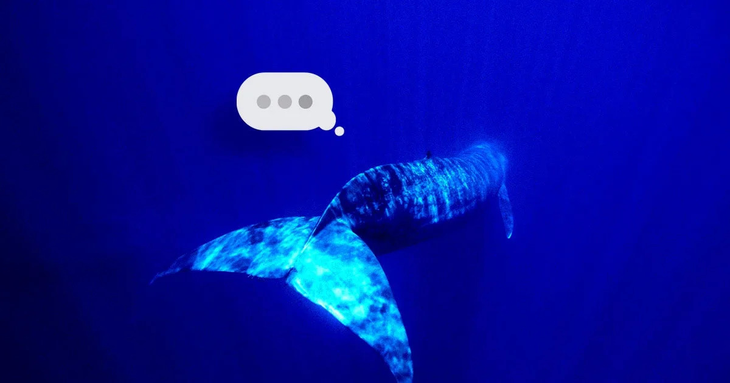Whales are not only the largest marine animals but also a "measure" of the health of the entire ocean - Photo: Yahoo
International scientists are sounding the alarm after discovering that the frequency of blue whale calls has dropped dramatically in recent years, raising concerns about the health and survival of the world's largest mammal.
According to National Geographic, researchers use special sonar systems with underwater microphones to record the calls and vocal activities of marine creatures. However, recent results show an unusual trend: blue whales are becoming increasingly "silent".
Research shows that intense ocean heatwaves over the past decade have created conditions for toxic algae blooms, polluting habitats and depleting the whales’ food sources such as krill. As a result, the frequency of blue whale calls has dropped by nearly 40%.
"This is the largest marine poisoning ever recorded. When you're hungry, you can't sing. Whales are no different. They spend all their time looking for food, they don't have the energy to communicate like they used to," said Dr. John Ryan, an oceanographer at the Monterey Bay Aquarium Research Institute and co-author of the study.
This situation is closely related to the phenomenon of "The Blob", a giant area of warm water discovered in the Pacific Ocean since 2013. By 2016, this area had spread over more than 3,000 km, causing the whales' food source to almost completely disappear.
Experts have also found that marine heatwaves are now three times longer than they were in the 1940s. This means whales and many other marine species face harsher living conditions than ever before.
“The entire ecosystem is being severely impacted,” biologist Kelly Benoit-Bird said of the link between climate change and marine life. When predators like whales can’t find enough food, they change their survival behavior, including stopping reproducing. This isn’t just a problem for one species, it can have far-reaching consequences, upsetting entire food chains and ocean ecosystems.
Dr Dawn Barlow, an ecologist from Oregon State University, also stressed that whales are not only the largest marine animals but also a "barometer" for the health of the entire ocean.
Changes in their migration locations and hunting behavior are clear warning signs that the marine environment is in serious trouble.
The Blob, an unusually warm mass of water that appeared off the Pacific coast in the mid-2010s, is a prime example. The event had a range of long-term impacts, from mass mortality of marine life and disruption of ecosystems to reduced fertility in whales and other marine mammals.
Action needed before it's too late
Scientists warn that if the ocean continues to warm beyond its tolerance threshold, it could lose one of its most important roles: absorbing carbon from the atmosphere. At that point, global climate change will become more severe, beyond human control.
“Climate change is having a direct and unforgiving impact on the ocean,” concluded Dr Barlow. “The ocean is sending us clear signals of change, uncertainty and imbalance. We must listen and act before it is too late. It has never been more urgent to listen to nature.”
Back to topic
MINH HAI
Source: https://tuoitre.vn/ca-voi-xanh-dot-ngot-im-tieng-chuyen-gi-xay-ra-20250803172601372.htm























![[Photo] Discover the "wonder" under the sea of Gia Lai](https://vphoto.vietnam.vn/thumb/1200x675/vietnam/resource/IMAGE/2025/8/6/befd4a58bb1245419e86ebe353525f97)



![[Photo] Nghe An: Provincial Road 543D seriously eroded due to floods](https://vphoto.vietnam.vn/thumb/1200x675/vietnam/resource/IMAGE/2025/8/5/5759d3837c26428799f6d929fa274493)






































































Comment (0)